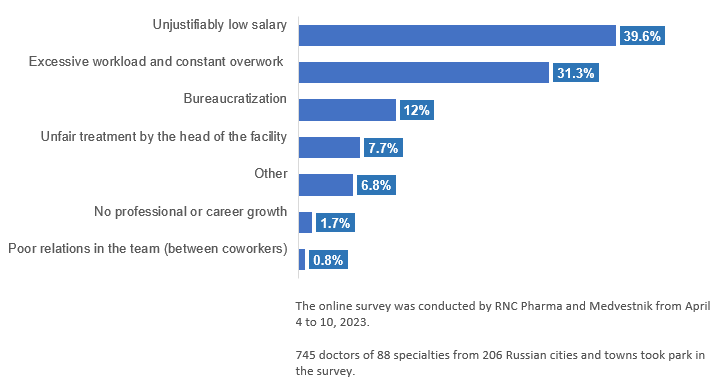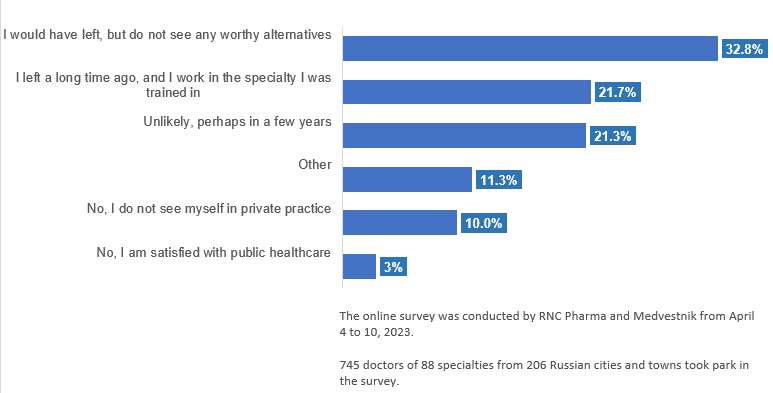Study by RNC Pharma and Medvestnik: 70% of Russian Doctors Want to Leave Public Healthcare Due to Low Salaries and Overwork, 30% Would Leave if Offered Decent Alternatives
39.6% of physicians think they could leave public healthcare in favor of a private medical institution due to “unjustifiably low salaries”, according to a survey conducted by the RNC Pharma analyst company and the Medvestnik platform for doctors. Another popular reason is “excessive workload and constant overwork”, voted by 31.3% of the respondents.
Some participants (12.1%) spoke of the bureaucratization of the healthcare system. The respondents who chose to give their own answer partly agree with them, stressing the formal nature of accreditation procedures. 7.7% of the doctors are ready to leave because they think they are treated unfairly by the head of the institution.
Only 1.7% and 0.8% of the respondents noted “lack of professional or career growth” and “poor relations in the team”, respectively. Those who chose to give their own answer also stressed the problem of aggressive patients trying to extort money from clinics, which, in addition to the increasingly negative image of the doctor, is exacerbated by the fact that it is nearly impossible for physicians to defend their rights in controversial situations.
Fig. 1. What could prompt you to leave public healthcare? (single-answer question)

Despite these difficulties, around 67% of the respondents do not plan to leave for private medical practice this year. The reasons, however, are quite different. For example, as many as 32.8% of the doctors note that they “would like to leave, but do not see any worthy alternatives.” While another 21.3% specialists are not yet ready to change jobs, they may consider leaving the public sector in a few years, after gaining the necessary experience. About 10% simply do not see themselves in private medical practice, with reasons varying from needing to focus on “making profit” to their specialization not represented in private medicine, suggested by a respondent working in pediatric oncology. Finally, 2.9% of the study participants, including not only heads of medical organizations, but also GPs, pediatricians, surgeons, traumatologists and other specialists, are generally satisfied with everything in the public sector.
Around 21.7% of the physicians say that they have long since left public healthcare and are now working in private clinics in the specialty they were trained in. Notably, this answer was more popular among residents of Moscow and St. Petersburg (30%) than in other regions (11%). In large cities, private medicine is much more developed, leading to staff shortages in a number of satellite cities of Moscow and St. Petersburg.
Those respondents who chose to give their own answer note that they do not leave only because they have obligations under a number of state programs, in particular, Moscow Oblast programs Social Mortgage, which introduces a reduced rate mortgage, and Land for Doctors, which allows doctors to receive a land lot for free.
Fig. 2. Are you considering leaving this year? (single-answer question)

 Рус
Рус




